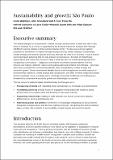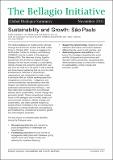| dc.contributor.author | Waldman, Linda | |
| dc.contributor.author | Shankland, Alex | |
| dc.contributor.author | Favareto, Arilson | |
| dc.date.accessioned | 2014-03-27T18:20:26Z | |
| dc.date.available | 2014-03-27T18:20:26Z | |
| dc.date.issued | 2011 | |
| dc.identifier.citation | Waldman, L. Shankland, A. Favareto, A (2011) 'Sustainability and growth: São Paulo' Bellagio Initiative report, Brighton: IDS | en_GB |
| dc.identifier.uri | https://opendocs.ids.ac.uk/opendocs/handle/20.500.12413/3694 | |
| dc.description.abstract | The Global Dialogue on Sustainability, Climate Change and Economic Growth was held in São Paulo in October 2011. It was co-organised by the Brazilian Centre for Analysis and Planning (CEBRAP) and the Institute of Development Studies (IDS). The idea was to bring together practitioners and thinkers to explore through dialogue the key issues relating to sustainability, climate change and economic growth both now and over the next 20 or 30 years. It was a diverse and broad-based gathering that not only included entrepreneurs, directors of philanthropic organisations and researchers but also made a particular effort to include spokespeople from marginalised communities – indigenous and riverine smallholder representatives from the Amazon and Atlantic rainforest regions and a pastoralist representative from Ethiopia – who have often been excluded from conventional debates about sustainability, climate change and economic growth. These conventional debates focus on the biological and scientific aspects of environmental resilience, climate change and conservation, and often overlook indigenous people whose knowledge is key to meeting these challenges but whose livelihoods and wellbeing are threatened by unrestrained economic growth and technological expansion.
The key issues for philanthropists identified during the Dialogue were:
Recognising diversity and respecting plural perspectives on challenges and opportunities;
Facilitating autonomy through hands-on engagement with grassroots initiatives, going
beyond short-term project cycles and allowing for local-level learning;
Supporting relationships, helping to build networks and broker connections between
different levels, sectors and interests; and
Addressing power and politics in both forms of knowledge (integrating the social and the biological) and governance and decision-making processes, recognising that democratisation plays a critical role in relation to sustainability, climate change and economic growth. | en_GB |
| dc.description.sponsorship | The Rockerfeller Foundation | en_GB |
| dc.language.iso | en | en_GB |
| dc.publisher | IDS | en_GB |
| dc.rights.uri | http://www.ids.ac.uk/files/dmfile/IDSOpenDocsStandardTermsOfUse.pdf | en_GB |
| dc.subject | Economic Development | en_GB |
| dc.subject | Environment | en_GB |
| dc.title | Sustainability and growth: São Paulo | en_GB |
| dc.type | Series paper (non-IDS) | en_GB |
| dc.rights.holder | IDS, The Resource Alliance, The Rockerfeller Foundation | en_GB |


